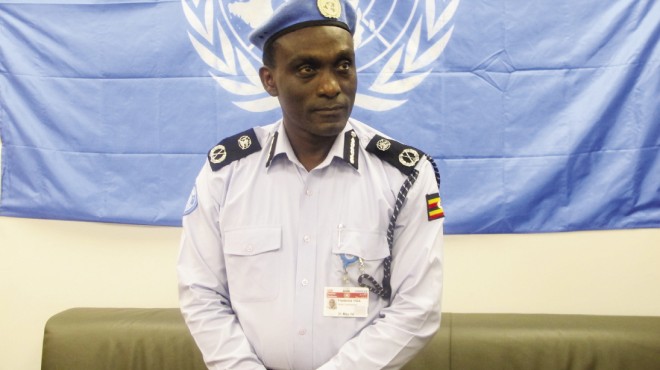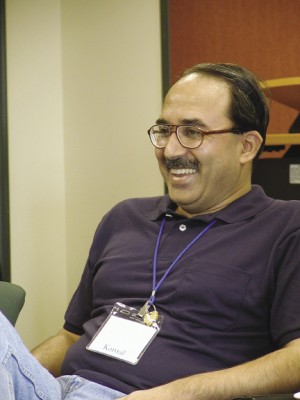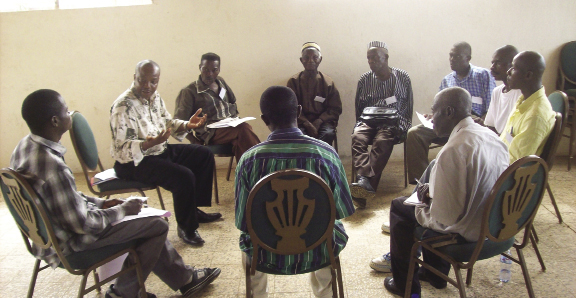
Decades ago, when international conflicts tended to be between neighboring countries, the United Nations’ approach to peacekeeping was primarily focused on observation and reporting. The blue-helmeted peacekeepers would sit peering through telescopes, trying to make sure people on either side of the border behaved.
Since the end of the Cold War, however, wars between sovereign states have increasingly been replaced by conflict within nations, often with meddling from proxy players. In the absence of functioning state institutions, UN peacekeeping missions have taken an increasingly hands-on role in these countries, expanding the scopes of their missions to include development, peacebuilding and state-building efforts, often in partnership with other organizations and agencies. Since the early 1990s in particular, peacebuilding and development have assumed greater importance throughout the UN system, beyond military-style peacekeeping activities.
As a police planning advisor with the UN Office to the African Union, Kamal Uddin Tipu, MA ’04, represents one facet of the new, broader approach to peacebuilding being employed by the United Nations everywhere, but especially in Africa, where the majority of its multidimensional peacekeeping missions are. Working closely with the African Union (AU) in Addis Ababa, Ethiopia, Tipu helps the organization plan the policing components of its peacekeeping missions across Africa. While Tipu provides the AU with his expertise as a police officer, he has colleagues who address more than a dozen related areas, including elections monitoring, military and civilian logistics, medicine, mediation, mine action and other structures necessary for sustainable peace after violent conflict has ended in a country.
“You have to go into all these areas to resolve conflict,” says Tipu, a deputy inspector general of police in Pakistan now deputized to the UN.

Police in support of stable governance
In South Sudan, which gained independence in 2011 after decades of civil war within Sudan, Fred Yiga, MA ’06, is also working to establish a functioning police force in a country almost devoid of state institutions when it became independent.
“The greatest casualties in South Sudan’s conflict were the institutions of governance,” says Yiga, an assistant inspector general of police in Uganda now serving as the UN police commissioner for the UN Mission in South Sudan. “Their frameworks and the whole notion of governance culture must be started from scratch.”
And so Yiga has begun doing just that, establishing police officer screening and payroll policies, conducting a needs assessment to guide planning for training and funding priorities, and developing policing models and programs such as police-community relations committees.
“There is a lot of hope that we are on the right track with police development in South Sudan,” continues Yiga, who anticipates the country having a well-trained and professionalized police force with influence in the wider region within five years. “We will definitely succeed!”
Developing a transitional justice process
Though it has not fallen into full-blown civil war like so many other African nations, Guinea has nonetheless been plagued by repeated violent conflicts over the past several decades. In southeastern Guinea, where Francois Traore, MA ’11, has worked as a human rights national program officer for the UN’s High Commissioner for Human Rights, the roots of these conflicts were the usual suspects like land disputes between farmers and livestock herders, or unequal access to natural resource revenues. Often, these conflicts have been exacerbated by ethnic and religious differences between the opposing parties.
Drawing on the “holistic approach” of EMU‘s Center for Justice and Peacebuilding and his study of restorative justice, Traore worked to develop a transitional justice process in this region of Guinea based on the Truth and Reconciliation Commission model pioneered in South Africa. (Former CJP professor Ron Kraybill was involved in South Africa’s truth-and-reconciliation program at its conceptual stage, as was current professor and CJP alumnus Carl Stauffer, who lived and did peace work in South Africa from 1994 until he came to teach at CJP in 2010.)
In addition to the cultural, religious and economic aspects of these conflicts, generational divides within these communities have eroded their traditional conflict resolution methods. In the past, Traore said, elders from opposing sides used an animal sacrifice, shared a meal, and performed oath-taking rituals to resolve or prevent conflicts. Younger people in these communities, however, view such practices as outdated and irrelevant to modern life and problems – adding another layer of complexity to the violence in the region.
“Understanding these dynamics and linking them to the conflicts they generate requires a strong peacebuilding theory,” says Traore, who left the UNHCHR in 2012 for a position with the USAID Mission in Guinea and Sierra Leone. The multi-disciplinary nature of his studies at CJP, he says, has allowed him to play a leadership role in developing a transitional justice component to a nationwide reconciliation process planned for the near future.

Community-based early warning systems
Just across the border in Liberia, Nat Walker, MA ’10, is leading the development of an early warning and early response (EWER) network to respond to conflicts in communities across the country. This first entailed establishing community-based EWER networks, linking local peace committees with a network of responders that includes civil society groups, UN agencies and Liberian government agencies.
Now, Walker is setting up “rapid response centers” in the cities of Gbarnga, Zwedru and Harper. These centers figure into a larger, countrywide peacebuilding and reconciliation program supported by the UN Peacebuilding Fund and the Liberian government.
“Linking the current EWER initiative with the bigger, UN-supported justice and security framework in the country is critical to maintaining peace and security in Liberia, especially as the UN mission draws down its military strength,” he says.
Walker is a long-term consultant on the project with Humanity United, an American NGO which is working in partnership with the Liberian Peacebuilding Office, the UN Peacebuilding Fund, and other governmental and NGO partners. The community-level conflict monitoring and response systems, Walker says, play an important role in Liberia, where state security institutions are weak or absent entirely.
Walker says his experience at the Center for Justice and Peacebuilding, combining “critical peacebuilding theories” and “sound practice-based education,” have given him a grasp of conflict-sensitive development and organizational development skills, enabling him lead the conceptualization and development of EWER networks in Liberia.
Once conflicts or potential conflicts are identified and reported by EWER personnel, Walker says, response activities include formulation of policy recommendations, advocacy campaigns led by civil society organizations, and community-level mediation and dialogue led by members of the community. Incidents and the responses are later analyzed to improve the community’s ability to address future conflicts.
“[This means] local conflicts are dealt with before they escalate to disrupt community and national peace,” says Walker.
EWER is by no means unique to Liberia. Working for Mennonite Central Committee, Gopar Tapkida, MA ’11, nurtured into existence a similar system in Nigeria, the Emergency Preparedness and Response Team, supported by 10 organizations, encompassing Muslims, Catholics, Evangelicals, women’s groups, the Red Cross, UNICEF and others committed to promoting nonviolence and peacebuilding. Team members covering 175 states use text messages to confer with each other about possible threats and rumors of attacks.

Need to build peace from bottom up
In Darfur, Sudan, Moussa Ntambara, MA ’02, spent two years, through the summer of 2013, as a manager with the UNDP’s Darfur Community Peace and Stability Fund. He oversaw around $10 million annually in funding provided to other UN agencies and NGOs working on grassroots peacebuilding projects in all five states of Darfur, where inter- and intra-community conflicts arose over issues such as access to natural resources.
Ntambara supervised teams of specialists and monitors who oversaw work in the field and provided technical assistance, project quality review, and feedback on project implementation. “My major role, as it relates to my education in peacebuilding, consisted in the development of engagement for peace strategies, identification of entry points, key actors and factors identification, peacebuilding methodologies and guidance on approaches,” says Ntambara, who now works in Bamako, Mali, as head of child protection for UNICEF.
Abou Ag Ahiyoya, MA ’12, a former chief superintendent of police in Bamako, Mali, was one of the leaders of the civilian police force dispatched to the Darfur area of Sudan by the African Union from 2005 to 2007. For a while, Ahiyoya was the acting chief of police operations under the African Union, serving a vast refugee population and supervising almost 1,000 officers from about 25 African countries. Toward the end of his tour of duty in Darfur, he worked as a member of the transition team preparing for the UN’s African Mission in Darfur.
In Darfur, Ahiyoya dealt with killings, rapes, and other crimes on a daily basis. He saw children growing up without families, and tens of thousands without real homes. “I witnessed the consequences of war – I don’t want this to happen to any community or country,” he recalled in a 2011 interview at Eastern Mennonite University.
By 2008, Ahiyoya was deputy director of the national police academy in Mali and the director of the UN’s training program for police and peacekeepers within the Ecole de maintien de la paix in Mali. He also was a consultant and facilitator at the Pearson Peacekeeping Centre in Canada.
When Ahiyoya was earning his CJP master’s degree as a Fulbright Scholar during 2010-12, his heart was heavy with the knowledge that his country was spiraling into bloody chaos, without the international community seeming to care. As he feared then, the situation has worsened over the last several years.
Belated intervention by the military of France on Jan. 11, 2013, did not bring peace to Mali. As of fall 2013, there was a UN-supported “stabilization mission” comprising more than 10,000 military personnel and 1,440 police, plus staff providing humanitarian assistance, but they are trying to operate in a dangerous, volatile situation.
“The AQMI [Saharan fighters inspired by al-Qaeda] are recruiting lots of our youths because they don’t have jobs,” Ahiyoya told Peacebuilder in an interview published in the spring-summer 2011 issue. “We need to address the causes of terrorism and solve problems from the bottom up.”
UN is cumbersome but irreplaceable
Sometimes the UN system is criticized for being a large, confusing bureaucracy that is hard for those outside of its structures to understand. As an example, the DCPSF (the UN program Ntambara worked for in Darfur, beneath the UNDP’s umbrella) partners with numerous other agencies and organizations, including UNAMID in Darfur, itself a specific collaboration between the United Nations and the African Union, which is known as UNOAU, where Kamal Udin Tipu serves as a police planning advisor.
As confusing as the system may seem, Tipu says the United Nations nevertheless has “been very active in keeping peace” around the world, and is refining, improving and strengthening its approach to peacebuilding by addressing the root causes of conflict rather than simply intervening in violent conflict. And, he says, consider the alternative: “If there’s no UN, what else do we have?”